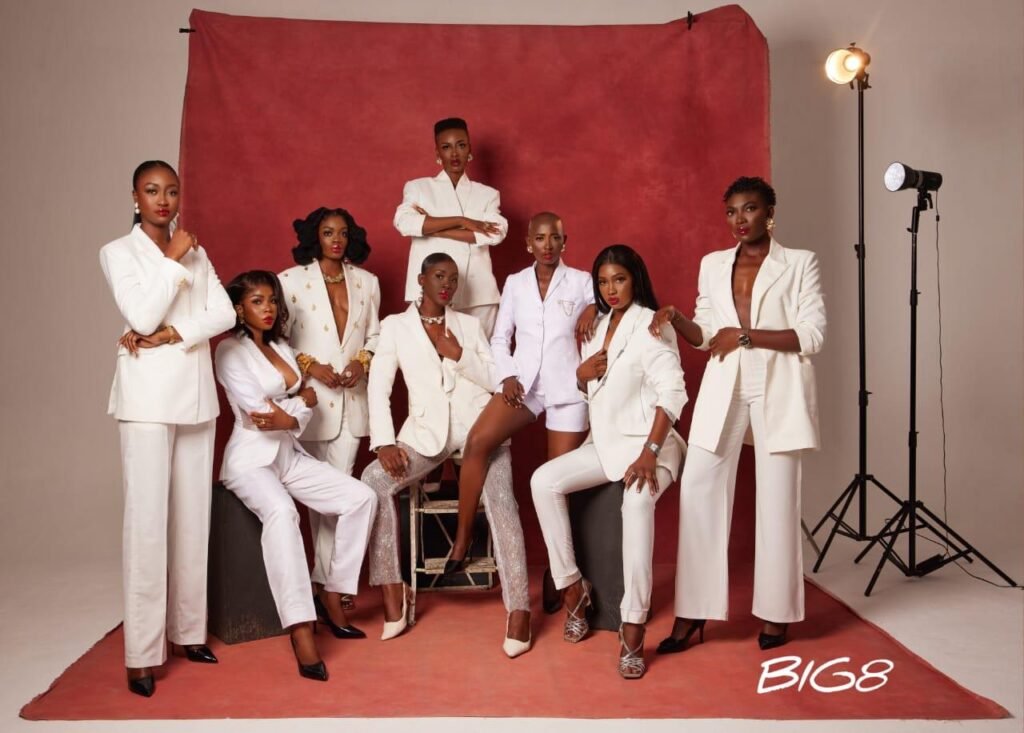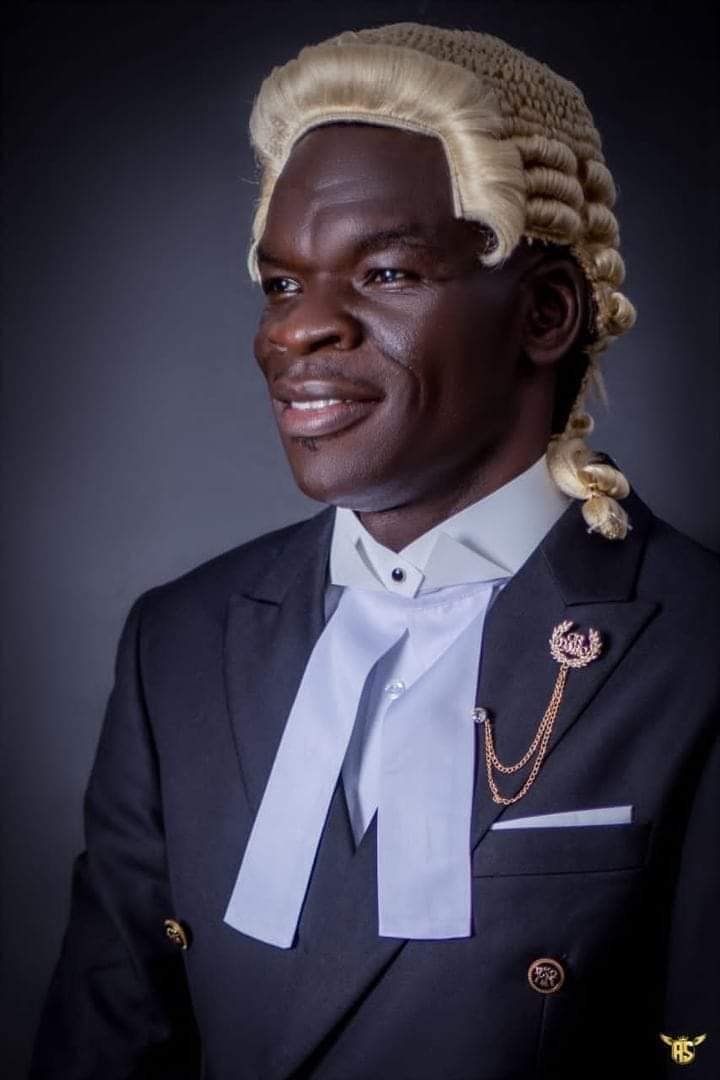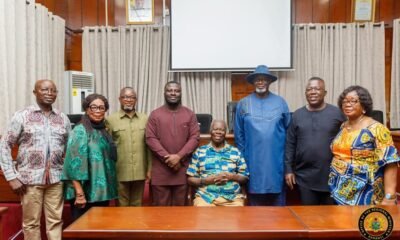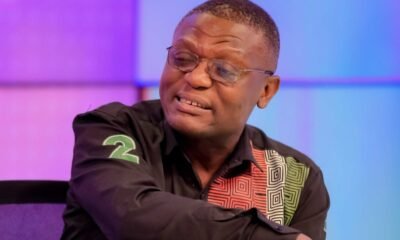Profile
Promoting sustainable environment: Up-close with Makafui Awuku …brain behind plastic bus shelter project

Thursday, February 3, 2021, saw the inauguration of a modern bus shelter made from recycled plastic at Dzorwulu Junction in Accra.
The project, first of its kind in the city, had gained positive reviews since it was outdoored and would remain a proof of the creativity of a Ghanaian youth as there numerous alternative uses of plastic waste in the country.


This paper puts the spotlight on, Mr Makafui Awuku, the Founder and Chief Executive Officer of Mckingtorch Africa, the initiator of the project, as he continues to push the “sustainable environment” agenda and encourages people to be “more responsible” in handling plastic waste.

Project
Constructed with recycled plastic beams, ‘chale wote’, used car tyres, used gallons, plastic bottles, burnt clay brick, among others, the bus shelter, according to Mr Awuku, was to demonstrate that recycled plastic could become “a durable construction [material] and relevant resource that can create jobs.”
The Environmentalist, Innovator, Artist and Entrepreneur, had started working with plastics in 2017 before registering Mckingtorch Africa in 2018.

He said the bus shelter idea was hatched in 2020 but the execution was postponed until he found a partner organisation which was interested in funding the innovation.
“I got the funding in February 2021, applied for permit which took about six months, and we started working on the designs and dimensions. Some of the material we wanted to use also took about six months to be ready so it was really a long journey but we finally built it in January 2022,” he told The Spectator.
Challenges
He said apart from funding and the delay in completing the project, finding a suitable location was another hurdle as the team took into account various factors to ensure the shelter served its intended purpose.
“We looked at a various locations within the jurisdiction of Awayaso West Municipality and the Dzorwulu Junction was the most suitable,” he stated.
Although the fund released for the project was about GH¢ 20,000, Mr Awuku said the cost had increased to GH¢ 45,000 due to delay in getting some materials and equipment for the construction.
“It was the first time we were building something from plastic lumber which is an innovation in Ghana. We had to do a lot of experiments and buy some devices we did not think we would have used.
“As we built, new ideas and designs came and all these influenced the cost,” he noted.
Objectives
Touching on the lifespan of the project, the Founder explained that the materials used were fire and water resistant and would, therefore, be able to “last as long as it can.”
Among other objectives, he said that the construction of the bus shelter was to explore “sustainable ways of keeping plastic waste out of the environment and how plastic beam innovation could be used as a viable alternative for wood and other materials for construction.”
“It is one thing to create the innovation and it is another thing to make it relevant enough to make people experience how it can be used in everyday life.
“If we are not able to create something we use in everyday life, it would be difficult to solve the plastic waste problem,” he said.
McKingtorch Africa, as the initiator of the project, had support from partners including: Geodrill Ghana, Ayawaso Municipal Assembly, Academic City University College, Pyramid Recycling, Caveman Watches, AB Solar, and Yielding Accomplished African Women.
Mr Awuku indicated that the company was looking forward to building more of the bus shelters across the country in future when it found “ideal locations,” and would possibly incorporate features such as USB charging ports and in-built radio to enable people to listen to news or music while waiting for transport or resting.
Invention
In addition to other innovations, Mckingtorch Africa produces sandals, rubbish bins, flower pots, wall artworks, laundry baskets, bracelets and other products from plastic waste.
The company, he added, was focused on making an impact on future generations, and would continue to produce long-lasting products from plastic waste as well as develop programmes to ensure plastic waste do not end up at the landfill sites.
Expressing his view on the waste pollution menace in the country, Mr Awuku stressed the importance of adding value to plastic waste, and the need to promote recycling to limit the impact of waste on the environment.
Background
Mr Awuku hails from Keta in the Volta Region. He studied Marketing at the University of Professional Studies Accra (UPSA) and took up an additional course in Environmental Management along side the programme.
He is an alumnus of the United States Young Africa Leaders Initiative (YALI) and received training on the Sustainable Development Goals in 2017.
In 2018 and 2020, he was listed among the 50 Most Influential Young Ghanaians by Avance Media, a Media and Public Relations Agency.
He had won a United Nations Waste Recovery Grant and benefitted from a number of support programmes and contributed also to the Ghana Plastic Waste Management Policy.
He is a member of the advocacy group, One Ghana Movement, and is a part-time soccer coach at America International School.
The old student of Keta Secondary School has background in Sports Marketing and currently works at Academic City University College as Technology and Entrepreneurship Manager, responsible for turning student ideas into viable businesses.
By Ernest Nutsugah
Profile
Prisca Abah: Ghana’s modelling powerhouse

Ghanaian model, philanthropist and advocate, Prisca Abah, who is known for her contributions to the fashion industry, is strutting her stuff on higher levels.
She was recently selected as one of the models for the Big8 Girls Project, an initiative by Clinton Samuel to celebrate influential African models.
The project consisted of three episodes: the Bio Shoot which highlighted Abah’s professionalism through a corporate-themed photoshoot; Afrodeity which focused on showcasing her confidence and artistry, celebrating the African divine feminine and royalty which presented Abah as a symbol of African cultural pride, embodying strength and elegance.

The Big8 concept, produced by Clinton Samuel, intentionally highlights and celebrates the strongest and most influential models on the African continent, congratulating their steadfastness and contributions to the African fashion industry, even as they grind and win in other aspects of life.
The Big8 sets hierarchy and high standards in the African fashion and modelling industry, crowning eight of them with the ‘Top Model’ status as the leading female models in Ghana at the moment.
“Working with these fiery women will surely ignite more creative minds and stir the pot of positive competition,” said Clinton.

Abah’s early life and career
Prisca Abah began her modelling career in 2013, achieving her first notable milestone in 2014 with an editorial shoot for 5-Star International Modelling Agency. In 2015, she made her runway debut at the Ghana Fashion Awards.
From 2016 to 2018, Abah participated in major African fashion events such as Glitz Africa Fashion Week, Mercedes-Benz Fashion Week in Johannesburg, and Rhythms on the Runway.
During this period, she received accolades, including the “Best Female Model of the Year” and spoke as a UN Ambassador for Sustainable Development Goal 12 at the Sustainable Rice Platform Conference.
International recognition and pageantry
In 2022, Abah expanded her reach by entering the pageantry world. She placed as the first runner- up at the Beauty of Africa International Pageant and represented Ghana at the Miss Globe World Finals, where she earned the title of Miss Globe Africa 2022.

Philanthropy
Abah founded the Palins Foundation, a non-profit organisation, aimed at empowering women and youth through initiatives in education, skills training, and personal development.
Awards and collaborations
In 2023, Abah received the Best Model of the Year award at the Time Ghana Arts and Entertainment Awards. She has collaborated with leading designers such as Charlotte Prive and Ejiro Amos Tafiri, further solidifying her influence in African fashion.
Legacy
Prisca Abah is recognised not only for her contributions to the fashion industry but also for her philanthropic efforts. Her journey serves as an inspiration to young Africans, encouraging them to pursue their dreams while giving back to society.
By Edem Mensah Tsortorme
Profile
Juventus Duorinaah, Ghana’s first deaf Lawyer

In a landmark moment for Ghana’s legal landscape, Juventus Duorinaah Esq., has etched his name in history as the country’s first lawyer with a hearing impairment.
His journey from a humble background to breaking barriers in the legal profession serves as a powerful inspiration for countless individuals in the disability community, proving that determination and resilience can defy societal expectations and create pathways to success.
For Juventus, the recognition as Ghana’s first deaf lawyer feels surreal.
“It feels like a dream,” he reflects, acknowledging the stereotypes surrounding deafness and the humble background from which he hails.
Juventus’ passion for law sparked in 2008 while seeking admission to the University of Ghana (UG). Although he initially faced challenges due to the nature of the application process, the help of his older brother and his determined spirit led him to pursue a Bachelor of Arts degree in 2012, followed by a Master of Laws at Cardiff University in 2014.
His passion for the study of law became highly intense when he had to study alongside qualified lawyers from several jurisdictions, even though he did not have a legal background. Here, he faced the unique challenge of studying without sign language interpreters, relying instead on a palantypist to transcribe lectures.
Juventus’ role model was his professor and mentor, Professor Luke Clement, who profoundly inspired him in shaping his understanding of law and human rights.
He remembers Prof. Thomas Stephens from the University of Ghana School Of Law, who inspired him with his way of dressing, in-depth knowledge of the law and engagement with students.
He recounts the enormous challenges he encountered during the COVID-19 pandemic in 2020, when lectures moved online, and Dr Stephen’s tremendous support to ensure things moved quickly and smoothly for him.
“I also had the chance to have a few classes with the Dean himself, Prof. Raymond Atuguba. He taught the course such that some of us never felt scared as other lecturers made the course,’ he recalled.
Juventu’s academic journey was fraught with challenges, particularly in communication.
The year 2007 was the last time he studied with deaf peers. He was often the only deaf person in his classes throughout the following years of his education, which made interaction with peers difficult.
Despite these hurdles, he remained high-spirited, studying late into the night and seeking help from kind classmates when necessary.
Reflecting on his academic experience at UG, he connected his affection for the university to his older brother, who is also an alumnus. He felt inspired to be a student of the premier university, saying he would choose the University of Ghana any time, any day, if given the chance to further his studies or work.
The University Of Ghana School Of Law, along with its Dean, Professor Raymond Atuguba, the Director of Legal Education of the Ghana School of Law, Yaw Bramiah Oppong, and his capable team, including the Registrar and Deputy Registrar of the Ghana School of Law and the Office for Students with Special Needs (UG), made significant contributions to his journey.
Prof. Atuguba acknowledged Juventus’ achievement as evidence of the university’s commitment to Diversity, Equity and Inclusion.
Commenting on how the school accommodated his special needs, Prof. Atugugba explained that ‘In the case of Juventus, we worked closely with him to understand and address his special needs, ensuring he had access to the teaching and learning resources in the appropriate formats that would support his academic journey.
Professor Atuguba noted that Juventus’s journey is just beginning, and the future holds promise for him and the many lives he aims to touch along the way.
Juventus’s close friend, Ida Esi McOwusu Esq., described her first encounter with Juventus as ‘intriguing.’ “My first meeting with Juventus was in class, where he sat right in front of me in first year,” Ida reveals. She was intrigued and wanted to find out more about him, especially how Juventus navigated his way to this level. “I got closer and we became friends from there,” she remarked.
Mr Francis Kweku Essel, Juventus’ interpreter, shed light on the primary challenges he faced in carrying out his job, particularly the complex nature of legal terminology and concepts. This validates Ida’s comment on the interpreters’ lack of legal background as a challenge Lawyer Duorinaah encountred.
Juventus dreams of becoming a judge and aims to enhance justice delivery while serving as a role model for young people with disabilities.
He is currently mentoring a group of young deaf students interested in pursuing law, hoping to pave the way for future generations. What’s next for Lawyer Juventus? His next step is to complete his pupilage, after which he can decide further his legal career.







